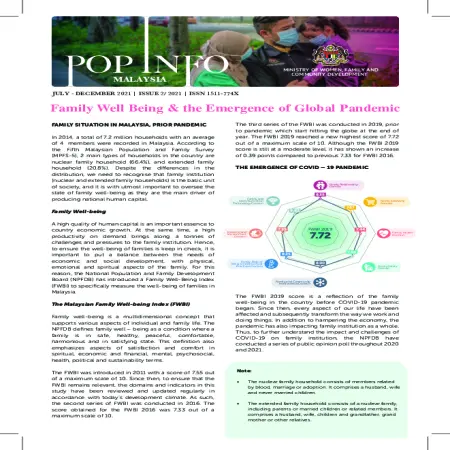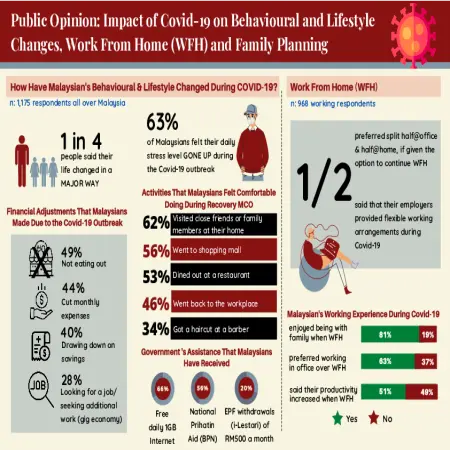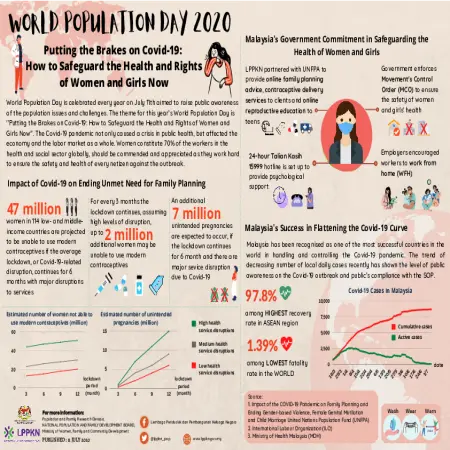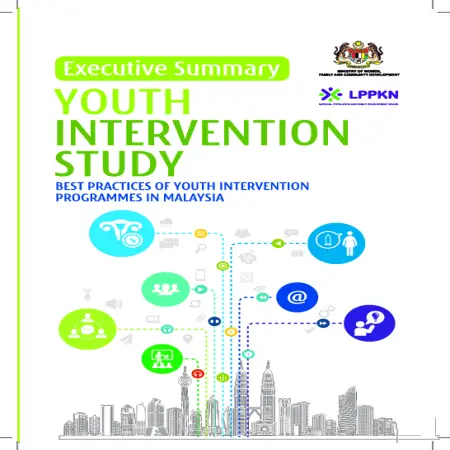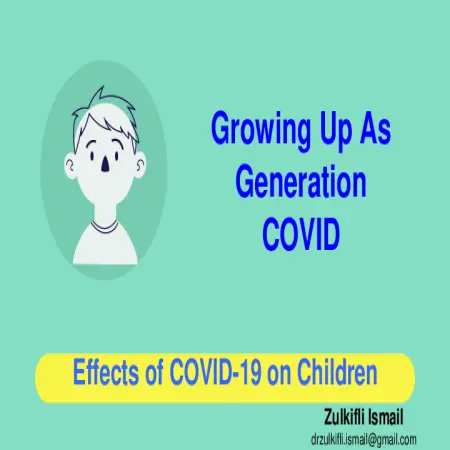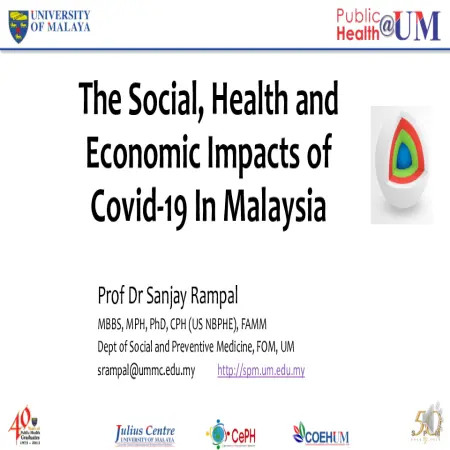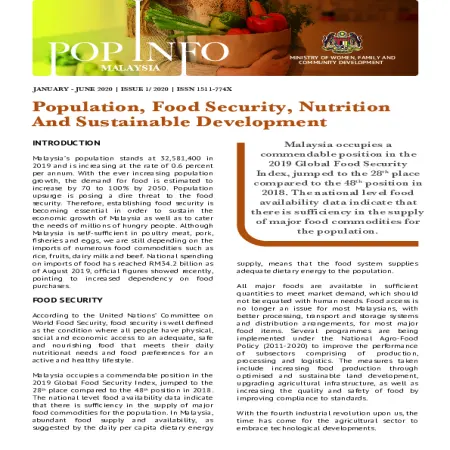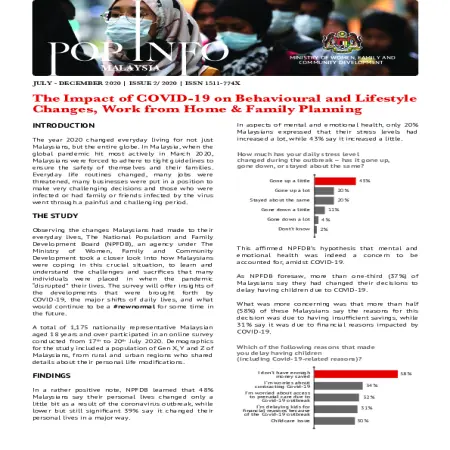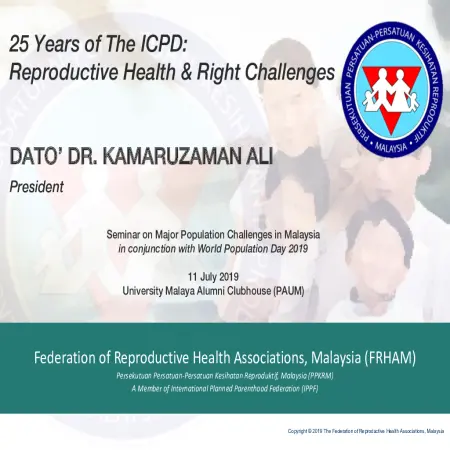TOPICS
Results for Topics : "Health"
|
|
Family well being & the emergence of global pandemic
Item Type: Newsletter
Editor:
Year: 00/00/2021
Abstract: National Population and Family Development Board (NPFDB) has introduced a Family Well-Being Index (FWBI) to specifically measure the well-being of families in Malaysia. The third series of the FWBI was conducted in 2019, prior to pandemic which start hitting the globe at the end of year. The FWBI 2019 reached a new highest score of 7.72 out of a maximum scale of 10. Although the FWBI 2019 score is still at a moderate level, it has shown an increase of 0.39 points compared to previous 7.33 for FWBI 2016. The FWBI 2019 score is a reflection of the family well-being in the country before COVID-19 pandemic began. Since then, every aspect of our life have been aff¬ected and subsequently transform the way we work and doing things. In addition to hampering the economy, the pandemic has also impacting family institution as a whole.
|
|
|
|
|
|
Public opinion: impact of covid-19 on behavioural and lifestyle changes, work from home (WFH) and family planning
Item Type: Infographic
Editor:
Year: 27/07/2020
Abstract: This infographic shows the findings from the study covered the below areas: changes in Malaysians’ personal lives, emotional health / stress levels observed during the pandemic, financial adjustments during and since the pandemic, benefits from employers during the pandemic, changes in working conditions, environment and styles and family planning amidst COVID-19.
|
|
|
|
|
|
Putting the brakes on Covid-19: How to safeguard the health and rights of women and girls now
Item Type: Infographic
Editor:
Year: 00/07/2020
Abstract: World Population Day is celebrated every year on July 11th aimed to raise public awareness of the population issues and challenges. The theme for this year’s World Population Day is ''Putting the Brakes on Covid-19: How to Safeguard the Health and Rights of Women and Girls Now'. The Covid-19 pandemic not only caused a crisis in public health, but affected the economy and the labor market as a whole. Women constitute 70% of the workers in the health and social sector globally, should be commended and appreciated as they work hard to ensure the safety and health of every netizen against the outbreak.
|
|
|
|
|
|
Executive Summary: youth intervention study: best practices of youth intervention programmes in Malaysia
Item Type: Research Report
Editor:
Year: 01/07/2020
Abstract: In the decades, Malaysia has undergone rapid economic, social and cultural changes which impacted not only the daily lives of its people but also their worldview and values. This is particularly so for young people, as excessive exposure to information from the social media, internet and pornography had inevitably influence their lifestyle and behaviour. The socio-cultural changes are likely associated with an increased rates of non-marital sexual activity, increased rates of sex partner change and increased rates of sexually transmitted infections (STIs). In 2005, the Ministry of Women, Family and Community Development through NPFDB introduced the PEKERTI Programme to be implemented at KafeTEEN adolescents centres. The programme provides reproductive health services, counseling services and education and skill building to promote a healthy life and inculcate positive attitudes and moral values among young people.
|
|
|
|
|
|
The social, health and economic impacts of Covid-19 in Malaysia
Item Type: Conference or Workshop Item
Editor:
Year: 00/00/2020
Abstract: Can life ever return to normal? YES... Evolutionary-wise, humans are resilient beings. This is not a life-ending Pandemic. With a prepared healthcare system with sufficient capacity. “March of the Vaccines”. Acknowledging our vulnerability demands humility, but will allow us to mitigate this pandemic better. Fear clouds our intellect. To make better-informed decisions, we need to let go of our fear.
|
|
|
|
|
|
Population, food security, nutrition and sustainable development
Item Type: Newsletter
Editor:
Year: 00/00/2020
Abstract: Malaysia occupies a commendable position in the 2019 Global Food Security Index, jumped to the 28th place compared to the 48th position in 2018. The national level food availability data indicate that there is sufficiency in the supply of major food commodities for the population.
|
|
|
|
|
|
The impact of COVID-19 on behavioural and lifestyle changes, work from home & family planning
Item Type: Newsletter
Editor:
Year: 00/00/2020
Abstract: This survey will offer insights of the developments that were brought forth by COVID-19, the major shifts of daily lives, and what would continue to be a #newnormal for some time in the future.
|
|
|
|
|
|
Differentials in sexual and reproductive health knowledge among East Malaysian adolescents
Item Type: Article
Editor:
Year: 00/00/2019
Abstract: The aim of this study was to assess the knowledge of East Malaysian adolescents on sexual and reproductive health issues. Data were collected in March–July 2015 from 2858 adolescents aged 13–18 years from selected East Malaysian secondary schools using a self-administered questionnaire. Twelve items relating to sexual and reproductive health were used to measure respondents’ knowledge based on their responses ‘True’, ‘False’ or ‘Don’t know’, with the proportion of correct answers being the variable of interest. Cronbach’s alpha for the twelve items was 0.761 and the mean knowledge score was 6.8. While the majority of the respondents knew that a woman can get pregnant if she has sex with a man and that HIV and AIDS can be transmitted through sexual intercourse, knowledge about Malaysia’s abortion laws, that a woman can get pregnant if she has sex only once and that people with sexually transmitted infections may look healthy was poor. Older respondents and those from urban schools reported significantly higher knowledge than younger respondents and those from rural schools, respectively. More emphasis should be given in schools to the specific topics for which low levels of sexual and reproductive health knowledge were found, with greater attention being given to younger adolescents and those in rural areas.
|
|
|
|
|
|
25 Years of the ICPD: reproductive health and rights challenges
Item Type: Conference or Workshop Item
Editor:
Year: 00/00/2019
Abstract: To increase contraceptive prevalence will require strengthening the information, education and skills development of health care providers, repositioning of family planning, more public awareness on benefits and side effects of modern contraceptives, keeping abreast with modern contraceptive technology including LARC, male/boy responsibility programs, better data collection and monitoring including from the young and unmarried, collaboration and coordination with all stakeholders and delivery of quality services to all without discrimination and stigmatization.
|
|
|
|





